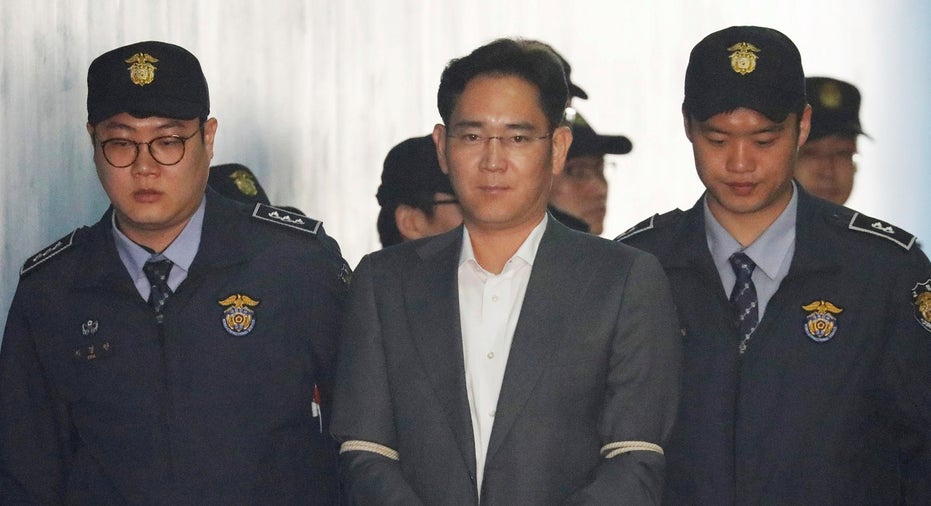Samsung Boss Goes to Trial

Flanked by security guards and dressed in a light gray suit, Lee Jae-yong, the de facto head of the Samsung conglomerate, entered a courtroom here and told a judge his birthday, job title and home address, as his trial began in a corruption scandal that has gripped South Korea.
Nearby, some of Mr. Lee's all-star team of 10 lawyers sat in two rows in a courtroom packed with about 150 people. The tycoon had arrived at the complex with his arms and wrists bound by a rope, but this was removed before he stepped into the hearing room.
The Samsung Electronics Co. vice chairman faces charges of bribery, embezzlement, perjury, hiding assets abroad and concealing profit gained from criminal acts. Four of Mr. Lee's lieutenants at Samsung face the same charges except perjury. All five have denied wrongdoing.
During Friday's hearing, the judge didn't directly ask Mr. Lee, 48 years old, for a formal response to the charges. He hasn't sought bail.
The hearing marked the start of a court case Korean media are calling the trial of the century. The case could stretch into next year, meaning Samsung, the world's largest smartphone maker, is likely to face a prolonged leadership vacuum. Mr. Lee's absence from the helm -- he is being held in jail -- comes as Samsung fends off calls from shareholders to shake up its structure and tries to recover from last year's costly recall of Galaxy Note 7 handsets.
Along with former President Park Geun-hye, Mr. Lee is the highest-profile figure in the corruption scandal. Prosecutors' case centers on some $37 million that Samsung arranged to pay to entities allegedly controlled by Choi Soon-sil, a friend of the former president. Samsung has acknowledged making some of the payments, but has denied they were in exchange for political favors. Ms. Park, who was removed from office last month, and Ms. Choi have denied wrongdoing.
The trial is getting under way as South Korea's family-run conglomerates, known as chaebols, face criticism over transparency and how they transfer power from one generation to the next. Scions have reduced inheritance-tax bills through means such as intra-conglomerate mergers, bond deals and initial public offerings -- which typically need government approval.
Prosecutors on Friday laid out the case as to how Mr. Lee and his lieutenants allegedly maneuvered to ensure Mr. Lee would take power from his father, who has been incapacitated since 2014 but remains chairman.
Mr. Lee holds just a 0.6% stake in Samsung Electronics, the conglomerate's crown jewel. For him, the 2015 merger of two Samsung affiliates was key for the transition of power. The deal would enable him to convert holdings in other affiliates more easily into cash -- important because he faces a potential multibillion-dollar inheritance-tax bill when his father dies -- without disrupting his hold on Samsung Electronics.
To achieve it, prosecutors said, Mr. Lee sought Ms. Park's support to order the National Pension Service, the largest shareholder in one of the affiliates, to cast a decisive swing vote in favor of the contentious merger. The retirement fund did so despite losing money as a result of the deal.
Prosecutors detailed for the first time discussions that took place in one of three meetings between Mr. Lee and Ms. Park. During one meeting, a prosecutor said, Mr. Lee mentioned Elliott Management Corp., the U.S. activist hedge fund that was opposing the merger. Mr. Lee told Ms. Park that assistance was needed to deal with Elliott, one of the prosecutors told the court.
Song Wu-cheol, Mr. Lee's attorney, denied that the exchange unfolded that way. He presented slide after slide of excerpts from the prosecutors' indictment, accusing them of taking liberties with the events.
Beyond the 2015 merger, prosecutors outlined how they said the Samsung empire and Mr. Lee benefited from their ties with the Park administration. The alleged gains included the sale of minor Samsung affiliates, the potential conversion of Samsung's life-insurance unit into a financial holding company, and the 2016 IPO of its biologic-drugs unit. These moves, at some juncture, required government approval or involvement.
Mr. Lee's lawyer, however, argued that these matters went beyond the president's purview because those decisions fell to other parts of government where she didn't have direct involvement. Samsung said the corporate actions were part of "normal business activities." The defense team denied that Samsung's succession planning needed an assist from the Park administration.
"The 2015 merger didn't require the president's support and there is no evidence that the president was involved," Mr. Song said.
If Mr. Lee is convicted, a prison sentence of at least three years is highly likely, according to several experts on the Korean legal system, though it could be significantly longer if he is found guilty on all charges.
Mr. Lee is the first Samsung leader to be in jail. His father, Samsung Chairman Lee Kun-hee, was convicted in 2008 for embezzlement and tax evasion but was pardoned and never served time in prison.
Despite the legal and political turmoil, Samsung Electronics' business is thriving. On Friday, the company said it expects a 48% increase in first-quarter operating profit from the same period a year earlier, helped by booming sales of semiconductors and displays.
The court hearing stretched more than seven hours and homed in, at times, on personal dynamics. In testimony, Mr. Lee's lawyer painted Ms. Park as a scolder, citing news reports describing her glare as a "laser beam."
A judge is expected to rule on Mr. Lee's case by late May, though lawyers can request extra time. The ruling can be appealed, ultimately to the Supreme Court.



















